|
|
|
Sort Order |
|
|
|
Items / Page
|
|
|
|
|
|
|
| Srl | Item |
| 1 |
ID:
138757


|
|
|
|
|
| Summary/Abstract |
One of the most prominent debates over minority participation in the military has been whether or not inclusive policies would undermine operational effectiveness. While the adoption of inclusive policy has tended to indicate that minority participation does not compromise effectiveness, the question has not yet been tested in the context of transgender military service. In this paper, we conduct the first-ever assessment of whether policies that allow transgender troops to serve openly have undermined effectiveness, and we ask this question in the context of the Canadian Forces (CF), which lifted its transgender ban in 1992 and then adopted more explicitly inclusive policy in 2010 and 2012. Although transgender military service in Canada poses a particularly hard test for the proposition that minority inclusion does not undermine organizational performance, our finding is that despite ongoing prejudice and incomplete policy formulation and implementation, allowing transgender personnel to serve openly has not harmed the CF’s effectiveness.
|
|
|
|
|
|
|
|
|
|
|
|
|
|
|
|
| 2 |
ID:
174932


|
|
|
|
|
| Summary/Abstract |
This paper explores and assesses the presence/absence of institutional arrangements in educational settings for addressing the concerns of gender-variant children (GVC) through a sample survey of schools in the three-country context of India, Sri Lanka and Nepal. This research highlights the need for effective regulatory, normative and cognitive structures to address issues of childhood gender variance. With a contextual analysis of recent developments and comprehensive study of data reports in the three countries, the study analyses multiple dimensions of discrimination and bullying of GVC in educational settings. Using qualitative and quantitative methods, this paper highlights causes and issues associated with the problems of GVC as well as affirmative actions and institutional practices required to be implemented in schools in the three-country context. The results and findings provide evidence that academic institutions in India, Sri Lanka and, to some extent, Nepal lack institutional mechanisms to address issues of homophobia, abuse by peer group, mental health issues, emotional challenges, social discrimination, lack of opportunities, lack of monitoring and counselling, micro-level engagements and high dropouts of GVC. This study also charts out futuristic agenda, such as comprehensive mapping of GVC in schools, implementation of effective counselling mechanism, the need to create and adopt basic reference module for educators around gender diversity and variance.
|
|
|
|
|
|
|
|
|
|
|
|
|
|
|
|
| 3 |
ID:
127921
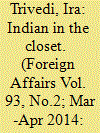

|
|
|
|
|
| Publication |
2014.
|
| Summary/Abstract |
On a bright January day, a group of around 200 lesbian, gay, bisexual, and transgender (LGBT) activists dressed in black, to symbolize mourning, gathered at Jantar Mantar, a site in New Delhi that frequently plays host to protests and demonstrations. Nearby, khaki-clad police officers warily observed the spectacle. The activists clutched rainbow flags to their chests and shouted slogans.
|
|
|
|
|
|
|
|
|
|
|
|
|
|
|
|
| 4 |
ID:
178244
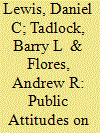

|
|
|
|
|
| Summary/Abstract |
Policy regarding the inclusion of transgender soldiers in the U.S. Military has shifted back and forth in recent years, with public opinion likely a significant factor shaping the eventual policy outcome. As such, this study examines the factors that shape public attitudes toward military service by transgender people. In particular, we examine the influence of sex, social gender roles, and attitudes toward gender in shaping transgender military service attitudes. Further, we hypothesize that personal experiences with the military and with transgender people, along with values, personality predispositions, and religion, are likely to influence individual attitudes. We test these hypotheses using data from a unique October 2015 national survey of American adults. The results suggest that personal experiences, attitudes toward gender roles, and religion have substantial but sometimes conditional effects on attitudes toward military service by transgender people.
|
|
|
|
|
|
|
|
|
|
|
|
|
|
|
|
| 5 |
ID:
102061


|
|
|
| 6 |
ID:
182850
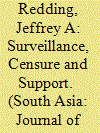

|
|
|
|
|
| Summary/Abstract |
Gender counting has been a longstanding concern of South Asian politics. For the past several years, gender counting has taken on central importance in South Asia in a new register. In both Pakistan and India, as part of a larger discussion on transgender rights and welfare, the state has engaged in various efforts to count the number of transgender persons living within its borders. In this recent (trans)gender counting, we see not only progressive welfare ambitions, but also the resurgence of regressive attitudes and practices towards transgender individuals, the transgender community and kinship practices.
|
|
|
|
|
|
|
|
|
|
|
|
|
|
|
|
| 7 |
ID:
138756
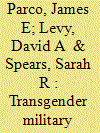

|
|
|
|
|
| Summary/Abstract |
This study is the first to systematically inquire into the lives of transgender men and women currently serving across the branches of the US military in the post-‘‘Don’t Ask, Don’t Tell’’ (DADT) repeal era. We employed an interview protocol from a stratified convenience sample (n ¼ 14) of clandestinely serving active duty, guard and reserve military members from the US Army, Navy, Air Force, and Marine Corps who self-identified as transgender or transsexual. Using phenomenology as a methodological foundation, we present a revelatory case study based on lived experiences from firsthand accounts furthering the collective understanding of gender dysphoria in a contemporary military context.
|
|
|
|
|
|
|
|
|
|
|
|
|
|
|
|
| 8 |
ID:
101299
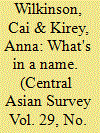

|
|
|
|
|
| Publication |
2010.
|
| Summary/Abstract |
In this article, we focus on the ways in which non-heterosexual and transgender youth involved with the non-governmental organization 'Labrys' in Kyrgyzstan have begun to demand the protection of their basic civil and human rights on the basis of self-identification as 'LGBT'. This acronym, which stands for Lesbian, Gay, Bisexual and Transgender, is relatively new to Kyrgyzstan and other post-Soviet states, and represents a change in the terms used by non-heterosexual and transgender people to describe themselves. We frame our discussion using the concepts of sexual citizenship, private/public divides and stigma and base our discussion on debates amongst the staff and community of Labrys about the purpose and scope of the organization. Centrally, we suggest that the strategic use of 'LGBT' as a public and politicized identity represents a new, pro-active form of stigma management. By employing this strategy, young LGBT people become 'would-be' sexual citizens and challenge traditional societal norms that seek to keep discussion of sex and sexuality in the private sphere and restrict rights to heterosexual, cisgender citizens.
|
|
|
|
|
|
|
|
|
|
|
|
|
|
|
|
|
|
|
|
|